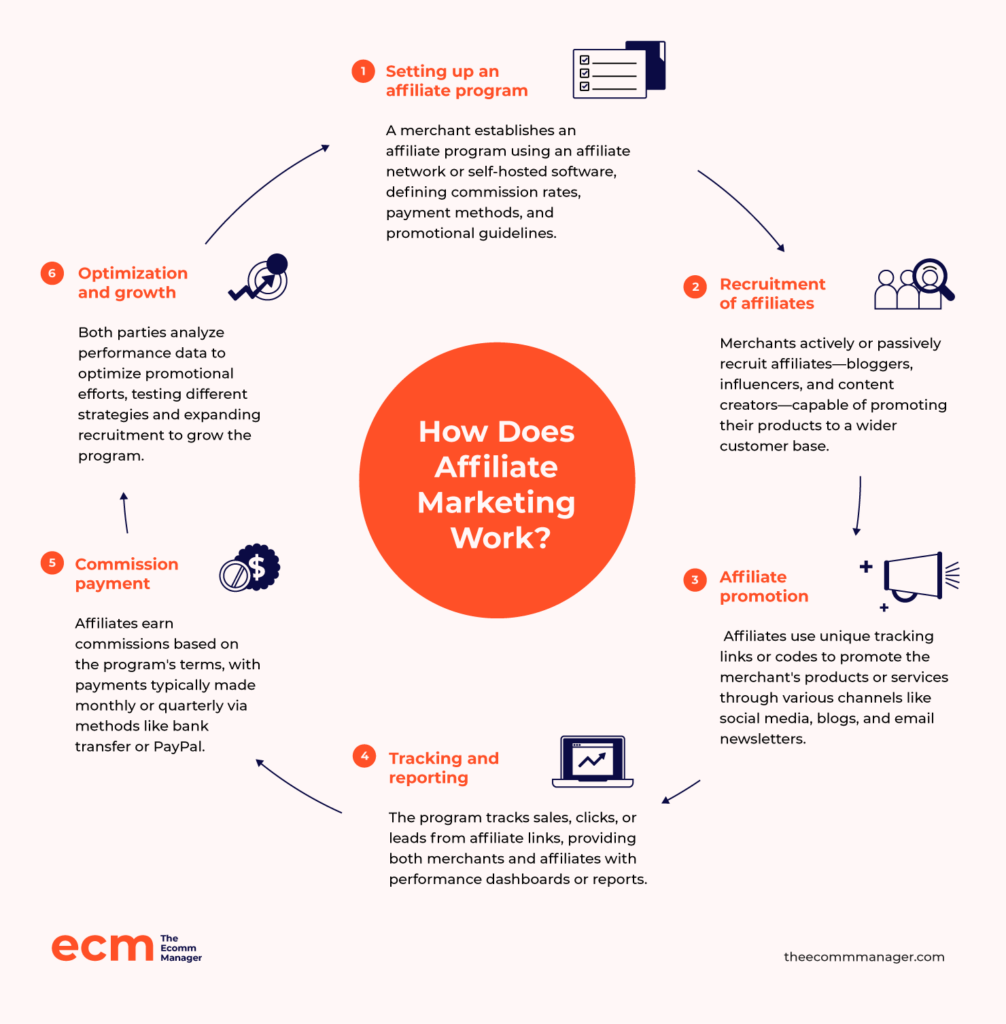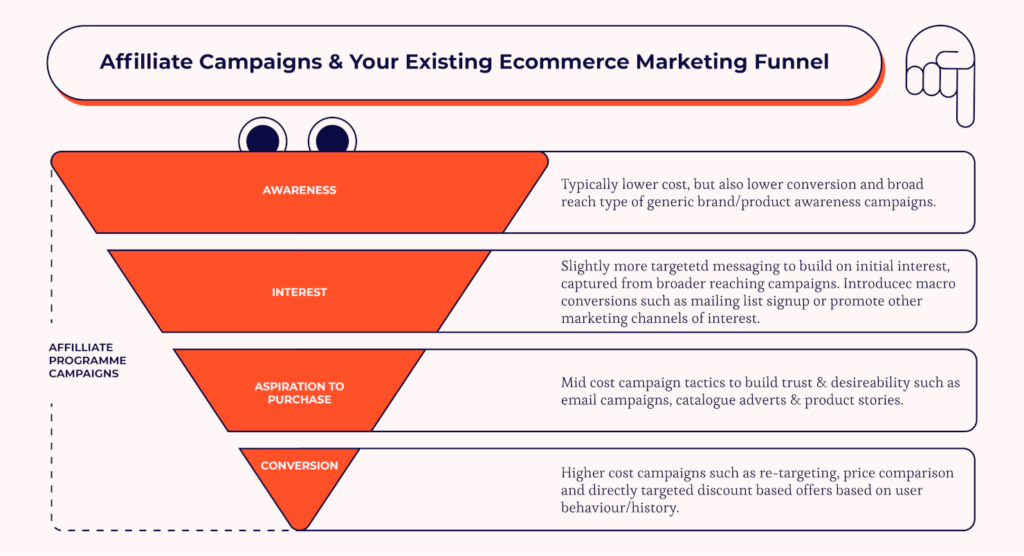Funneling the Potential: Ecommerce affiliate marketing allows engagement at all levels of the conversion funnel, offering a versatile approach to reach, interest, and convert potential customers through various tactics.
Beyond Traditional Advertising: Affiliate marketing significantly reduces upfront costs by operating on a commission basis, only incurring expenses after a successful sale, making it a cost-effective strategy for business growth.
A Symphony of Players: This marketing method involves three key players: the retailer, the affiliate, and the consumer, each playing a pivotal role in the journey from product discovery to purchase.
Dive into Diversity: The landscape of affiliate marketing varies from influencer collaborations to content-driven websites, offering multiple channels for brands to increase exposure and sales.
Ecommerce affiliate marketing is a digital marketing tactic used by many ecommerce brands and retailers.
A well-structured affiliate program can add value for both brand/product reach and down at the coalface of converting sales.
Not all affiliate programs are created equal, though. There are many options and potential pitfalls to consider when planning your own ecommerce affiliate program strategy.
I’ve been involved in successful affiliate campaigns for nearly a decade at several businesses. These range from “stack it high - sell ‘em cheap” type approaches to the far more curated, considered, and carefully positioned luxury fashion space.
I’ll take you on a deep dive into the world of affiliate marketing for ecommerce sales channels and how to position and, more importantly, scale a successful affiliate campaign within your business or organization.
What is Ecommerce Affiliate Marketing?
Ecommerce affiliate marketing is when a brand pays a commission or other incentive to an individual or website/blogger for any sales generated promoting your products or services.
So, a third-party website gets a commission on any leads they supply to your store that eventually convert into a sale.
They do marketing for you, you give them a piece of the action.
How does affiliate marketing work?
Affiliate marketing an ecommerce marketing strategy with a few moving pieces.
There are three key players in this marketing ecosystem. The retailer who offers the products, the affiliate who markets them, and the consumer who purchases these products.
Each plays a cardinal role in converting an impression to a sale, hence monetizing the action.

Let’s look at the process in detail:
1. Setting up an affiliate program: A merchant establishes an affiliate program using an affiliate network or self-hosted software, defining commission rates, payment methods, and promotional guidelines.
2. Recruitment of affiliates: Merchants actively or passively recruit affiliates—bloggers, influencers, and content creators—capable of promoting their products to a wider customer base.
3. Affiliate promotion: Affiliates use unique tracking links or codes to promote the merchant's products or services through various channels like social media, blogs, and email newsletters.
4. Tracking and reporting: The program tracks sales, clicks, or leads from affiliate links, providing both merchants and affiliates with performance dashboards or reports.
5. Commission payment: Affiliates earn commissions based on the program's terms, with payments typically made monthly or quarterly via methods like bank transfer or PayPal.
6. Optimization and growth: Both parties analyze performance data to optimize promotional efforts, testing different strategies and expanding recruitment to grow the program.
Tons of blogs are using affiliate marketing to monetize their following. You see it all the time, even if you don’t notice it.
Examples of ecommerce affiliate marketing in action
You have likely been the successful target of an affiliate marketing strategy.
Say you were in need of a really good gift for your mom just in time for Mother’s Day. So you search “best mothers day gifts” on Google and click through the top links—Wirecutter, NY Strategist, Vogue, Glamour, etc.
When you’ve found the perfect thing, you’ll click through to the ecommerce site and buy it.
The link you clicked was special. A few extra URL parameters ensured the source got paid for the extra help getting that bottom of funnel traffic.

So, knowing that, here are some examples of affiliate websites you might know:
- Wirecutter sends tons of traffic to all manner of products—from top appliances to best office chairs.
- Nerdwallet dispenses expert advice on products to get your money in order, suggesting certain bank products and getting a cut for the mention.
- Baby Gear Lab reviews products that frenzied parents are searching for in the hope it will solve all their problems. (It likely won’t, but who knows?)
- Minimalist Baker has tons of recipes and uses affiliate links pointing people to food items in the ingredients.
Sites like Wirecutter are absolutely rolling in it. They top so many of the search engine result pages (SERPs) for their target keywords, but they have lots of resources to cast a wide net.
Many affiliate websites take a more niche approach. For instance, Baby Gear Lab and Minimalist Baker can focus their more limited resources on one topic and build an audience to monetize it.
Much of this traffic gets sent to marketplaces like Amazon or even eBay, but retailers on Shopify and BigCommerce can easily take advantage of great apps or plugins to join the fun.
But, these aren’t the only type of affiliate marketing strategies out there.
Types of Affiliate Marketing
The most recognizable example of successful affiliate marketing in recent years has been the boom of the influencer marketing space.
But influencers are only one example of the types of exposure an affiliate campaign can bring to your business.
Let’s look at influencer marketing and other examples of affiliate-based marketing for ecommerce products in more detail.
Influencer marketing

This strategy taps into the credibility and persuasive power of social media influencers on platforms like TikTok, Instagram, Facebook, and Twitter.
By partnering with influencers whose audience aligns with their target market, brands can authentically promote their new products or services, driving both brand awareness and sales.
Influencers can range from well-known celebrities to micro-influencers with niche but engaged followings.
Bloggers and content creators

As I mentioned earlier, bloggers and content creators play a crucial role in affiliate marketing.
These publications produce detailed product reviews, tutorials, and editorial content that provides value to their readers.
This content, often hosted on their websites or platforms like YouTube, can influence purchasing decisions by offering in-depth insights into the products being promoted.
Podcasts and webinars

Emerging as powerful platforms for affiliate marketing, podcasts and webinars allow for deep dives into topics relevant to a product or service.
Speakers can integrate product mentions or endorsements into their content, reaching listeners who are engaged and interested in the subject matter.
This format is ideal for building trust and authority around a product.
Product reviews and comparison sites

Dedicated websites that offer product reviews and comparisons guide shoppers as they are reaching their purchase decision.
By providing comprehensive analyses and comparisons of products, these sites help highlight key features and benefits, often influencing the final decision to buy.
Affiliate links within these reviews direct readers to online stores, earning commissions for the reviewers.
Dropshipping and price comparison shopping services (CSS)

Dropshipping allows affiliates to sell products without holding inventory, while price comparison shopping services help consumers find the best deals online.
Both models benefit ecommerce entrepreneurs by broadening the distribution channels and making products more accessible to a wider audience.
Sub-networks of other publishers

These are aggregations of content publishers that offer a broader reach for affiliate marketing campaigns.
By tapping into these sub-networks, brands can access a diverse range of sites and platforms, maximizing their exposure across different audiences and niches.
Cashback and coupon-based listings

Cashback websites return a portion of the purchase price to the buyer, incentivizing them to buy through affiliate links. Similarly, coupon-based listings offer discounts to shoppers.
Both strategies enhance the appeal of making a purchase by providing direct financial benefits to consumers.
Email marketing

Integrating affiliate marketing with email campaigns can dramatically increase reach and conversion rates.
By including affiliate links in newsletters, promotional emails, or targeted campaigns, businesses can directly engage with potential customers who have already shown interest in their products or services.
What Benefits Does Ecommerce Affiliate Marketing Offer?
There are a number of reasons my clients and I like affiliate marketing. Here are the three big benefits we both see as we launch this strategy.
1. Value across the conversion funnel
As marketers or ecommerce strategic thinkers, we have a vast arsenal of tools and channels to achieve different objectives.
We must work on daily SEO and email marketing campaigns while always looking for more strategic, longer-term plans and opportunities to find new customers.
All this whilst keeping the return on investment (ROI) under careful control.
There’s a lot going on, so to provide some form of structure within the early days of planning any new marketing activity for our online business, we (I know I certainly do) regularly look to position these tactics within our old friend, the "Customer Conversion Funnel."
Often, we tend to think of or hear others talk about a certain marketing channel or tactic as being upper, mid, or lower funnel.
The funnel position is based on its propensity to create brand awareness, create reach for our product categories and product pages or, in an ideal world, generate a sale/conversion.
The beauty of a well-organized and strategically implemented affiliate program is that it can be effective at all levels of your marketing/conversion funnel.
A little further down, I’ll discuss in more detail how your affiliate program can drive value from the top to the bottom of the funnel.
2. Lower upfront costs
Another major benefit of affiliate marketing is typically commissions ("cost per acquisition" or "CPA") are only accrued after a sale has taken place.
So, instantly, you can see the potential benefit for affiliate marketing vs more traditional marketing efforts.
For instance, strategies like PPC (pay per-click) or paid social media/search content, while powerful, often require a substantial investment up-front regardless of the outcome.
Who doesn’t love to a strategy that’s so kind to their cash flow?
3. Lower CPA/CPC
In addition, depending on the category or publishers/bloggers, CPA/CPC for an affiliate marketing campaign can be cost-effective vs other conversion-driven tactics.
For example, a typical CPA is paid on net sales, exclusive of taxes & shipping, and ranges from anything between 2%-10%.
This can rise to 20% plus for the best affiliate/premium content channels with very large traffic volumes and proven regular revenue generation for their existing affiliate partner programs.
Lastly, another benefit to the affiliate model overall is that it is within every involved stakeholder’s interest, both as an advertiser (the ecommerce store) and publisher (third-party content creators), that an affiliate-based campaign works well.
This is true for both goals of strong customer reach in promoting the products/services and converting clicks and views into sales.
How Ecommerce Affiliate Marketing Works Across the Sales Funnel
OK, now let’s dig into that first major benefit more deeply. The sales funnel should always be front of mind for merchants as they develop their marketing strategies.
You need enough large volume plays to grab potential customers in their awareness phase while ensuring you don’t forget to develop the bottom of your funnel for them as they settle into the consideration and conversion phases.
An affiliate program can drive awareness, consideration, and conversion, if done right.

Upper/mid-funnel product awareness or discovery
A great affiliate program that promotes your products or services across your affiliate network is about way more than just sales and selling.
They can be a fantastic opportunity to increase your reach and brand awareness via content publishers focused on the grazing/discovery type of user behavior.
This typically includes users looking at blogs or listening to podcasts, social media, news/review articles, or shopping guides within renowned titles for a certain specific market vertical.
Publishers at the higher end of the CPC scale can also offer benefits, such as running their own paid advertising campaigns using paid search or banner ads or email marketing campaigns to promote your items to their already engaged audiences.
This creates a win-win scenario of boosting your brand awareness as well as product/brand reach.
Lower funnel, higher-converting activity
Many publishing partners that can be enabled via an affiliate marketing campaign are also strong for typically higher converting tactics positioned towards the bottom of your marketing/conversion funnel.
These content publishers tend to directly target consumers with a purchasing mindset, showing intentions of shopping more purposefully.
Examples of these are sites specializing in price comparison, Google shopping, and off-price clearance retailers.
How to Start Your Affiliate Marketing Program
Having likely piqued your interest by this point, you’re probably wondering how it all works.
Well, there are many ways to initiate an affiliate marketing program for your ecommerce brand. Let’s look at how to do it depending on your situation.
Self-hosting on ecommerce platforms
Major mid-tier ecommerce platforms like BigCommerce, Magento, and Shopify offer apps and plugins for businesses to self-host their affiliate programs.
This approach enables direct engagement with affiliates, allowing for the tracking of their traffic and the calculation of commission payouts based on sales they generate. This can be a really great route for certain verticals and startup ecommerce websites.
While self-hosting provides a high level of control and direct relationships with affiliates, it does come with drawbacks.
It can involve numerous manual processes and may be challenging to scale quickly, especially for businesses looking to expand internationally or support multiple currencies.
This method might be particularly appealing if you aim to foster close relationships with micro-influencers who can drive highly targeted referral traffic to your site.
Leveraging aggregator services for enterprise
For businesses aiming at the enterprise level, turning to services and tools like Rakuten’s LinkShare or the Awin network presents a viable alternative. These platforms offer:
- Aggregation and distribution: Acting as an aggregator, these services ingest a product feed formatted for Google Shopping and distribute it to a wide network of publishers and content creators. This forms the backbone of your affiliate campaigns, expanding your reach significantly.
- Offer creation: One of the key features of using these platforms is the ability to create varied "offers" with different commercial terms tailored to specific publishers or content creators. This flexibility is crucial for trading and offering different tiers of commission, making it a powerful tool for ecommerce businesses aiming for growth.
- Efficiency in management: Perhaps the most significant advantage of using aggregator services is the streamlined management of commission attribution. This efficiency frees up your resources, allowing you to focus on scaling your business rather than being bogged down by the intricacies of managing an affiliate program.
How to Decide Which Affiliate Platform or Program is Best For You
Once you’ve decided that you want to start an affiliate program for your ecommerce business, it’s time to start deciding which programs could be best for you as a business or your brand.
There are many key factors to decide on, but if using an aggregation platform such as the aforementioned services from Rakuten or Awin, there are a few top-level points to consider.
Managed vs unmanaged ecommerce affiliate programs
Most affiliate platforms operating within the enterprise space offer tiered pricing options for their fixed monthly services—managed and unmanaged.
- Managed Services:
- Offered at higher pricing tiers but include affiliate managers to kickstart your campaigns.
- Affiliate managers assist in selecting appropriate affiliate commission levels and connecting you with suitable partners to get the best return on investment.
- They provide analytics on your campaign's performance, help you understand competitor analysis, and support in navigating the affiliate marketing landscape from experience with other retailers.
- Unmanaged Programs:
- Require a more hands-on approach but offer more control over your affiliate strategy.
- Ideal if you have experience in affiliate marketing or a dedicated team to manage partnerships and analyze data.
A good starting point before looking outside is to first assess the skill set of your own team. Typical questions to ask yourself are:
- Do I have any experience in-house with managing affiliate programs at any scale?
- If I have resources, are they knowledgeable about the right publishing partners and sensible commission tiers to remain commercially viable whilst competing at the level I’m aiming for?
Your internal resources and time
If you are thinking of internally managing your affiliate program to save on monthly platform subscription costs, be mindful of the time required from your team to execute your marketing strategy.
If you are not actively building relationships with publishers and content producers to negotiate the prominent positions for your online store and affiliated content/products, it's crucial to regularly analyze and understand a wide range of performance data.
Not all affiliate publishers are equal, and you need to ensure you are in touch with core metrics such as conversion rates, return rates, or AOV from a specific channel vs the agreed commissions.
As with any ecommerce process, there is a wealth of data created, so the devil is in the details when getting the best return on investment from your affiliates.
Competitor analysis
Harking back to my first point, emphasizing the importance of understanding your market vertical within the affiliate space is crucial to the success of any affiliate program.
There are two aspects that are essential when getting started—market research and access to data.
- Understanding the market:
- It’s not just about who else is in the space, but what publishers they’re using, their target audience, and figuring out the typical commission structure you need to offer to be competitive and ensure key placements for your offering.
- Like any sales process in any business, you can’t sell to people who don’t know who you are, and this is also true within the affiliate space.
- Access to data:
- Without using a managed service from your platform provider, it can be difficult for beginners to get this data, and it can cost a lot more in trial and error through either lower sales volumes or overpaying on commissions.
- Affiliate marketing data is a lot more confidential than a typical PPC campaign from a search engine provider. With fewer tools to help you researchthe competitive landscape, a helping hand in the early days can pay dividends later on.
6 Ecommerce Affiliate Program Tips to Leverage For Success
Before we wrap up this topic, I want to impart some wisdom to help you develop the best possible affiliate program.

1. Create a strong product feed
Make sure you have a robust product feed from your website or ERP/PIM system that can be easily amended and edited.
This flexibility is crucial for optimizing your offerings and allows for strategic inclusion or exclusion of products based on negotiations with platforms or publishers.
It's particularly beneficial for protecting lower-margin items.
2. Align events with your KPIs
Consider the key events, KPIs, and milestones outlined in your marketing calendar.
Proactively reaching out to specific affiliate partners well ahead of these events can open up opportunities for collaboration.
This forward-thinking approach not only strengthens existing relationships but can also enhance the performance of your affiliate program.
3. Keep an eye on margins during sales events
Be cognizant of your sales cycles and any discount-driven promotions you plan to run.
Ensure that the margins you're working with can sustain the expected return on investment and any additional commission payments to affiliates.
This careful planning helps maintain profitability while leveraging promotions to boost affiliate performance.
4. Invest in premium placements
Prepare to invest in securing placements on premium publisher sites or applications. A competitive CPA (Cost Per Acquisition) offer is sometimes necessary to capture these high-visibility spots.
This investment can significantly enhance the reach and effectiveness of your affiliate marketing efforts.
5. Stay open-minded
Maintain an open-minded approach to your affiliate marketing strategy.
Many affiliates drive significant traffic back to your site, and you retain control over the customer experience and data collection (where permitted).
Embracing a broad network of affiliates can lead to early wins and provide valuable data for ongoing optimization.
6. Protect your assets
Ensure that your affiliates have access to high-quality assets that accurately represent your products.
This includes text, images, and videos that should be designed, approved, and stored in a way that makes them easily accessible to partners, potentially through a marketing resource management software.
This step is crucial for maintaining brand consistency and enhancing the effectiveness of affiliate promotions.
Affiliate is Going to Go Interstellar
So, to wrap up, affiliate marketing can quickly add multiple benefits to your new or existing ecommerce business.
It's unique in that it’s one of the rarer performance-based strategies that, on the whole, is driven by payment post-conversion and at commission rates that can be surprisingly good value.
While it can take time to build a program to order active from a standing start, spending time upfront to research and understand the landscape of the affiliate market for your own market vertical can pay dividends.
Maybe reach out to a few publishers/content creators you would love to feature on and simply ask them if they operate an affiliate program and if/what any programs or aggregators they use.
Some of the larger affiliate platforms regularly host free webinars or podcasts worth listening to on the daily commute.
On a personal note, I believe that as ecommerce switches from a traditional wholesale model into a marketplace model, affiliate marketing is going to go blow up even more over the next few years.
If you haven’t already, now is the perfect time to start exploring the potential benefits for your ecommerce business.
Please tell us about your own experiences within the affiliate space via our socials. It’s great to hear of others' experiences within the space.
Also, subscribe to The Ecomm Manager newsletter to receive updates on our new articles and interviews directly to your inbox.


